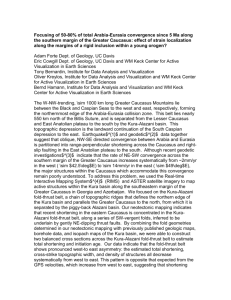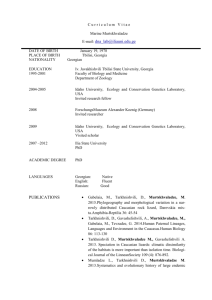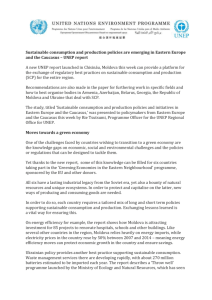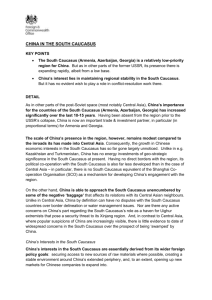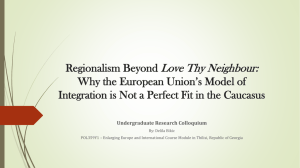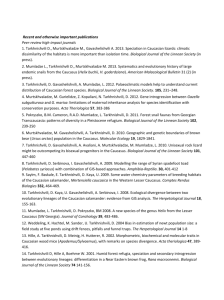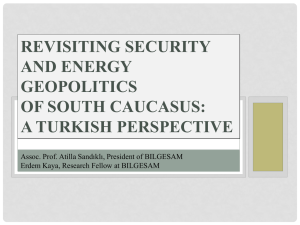GENDER PEACE AUDIT ON THE SOUTH CAUCASUS
advertisement
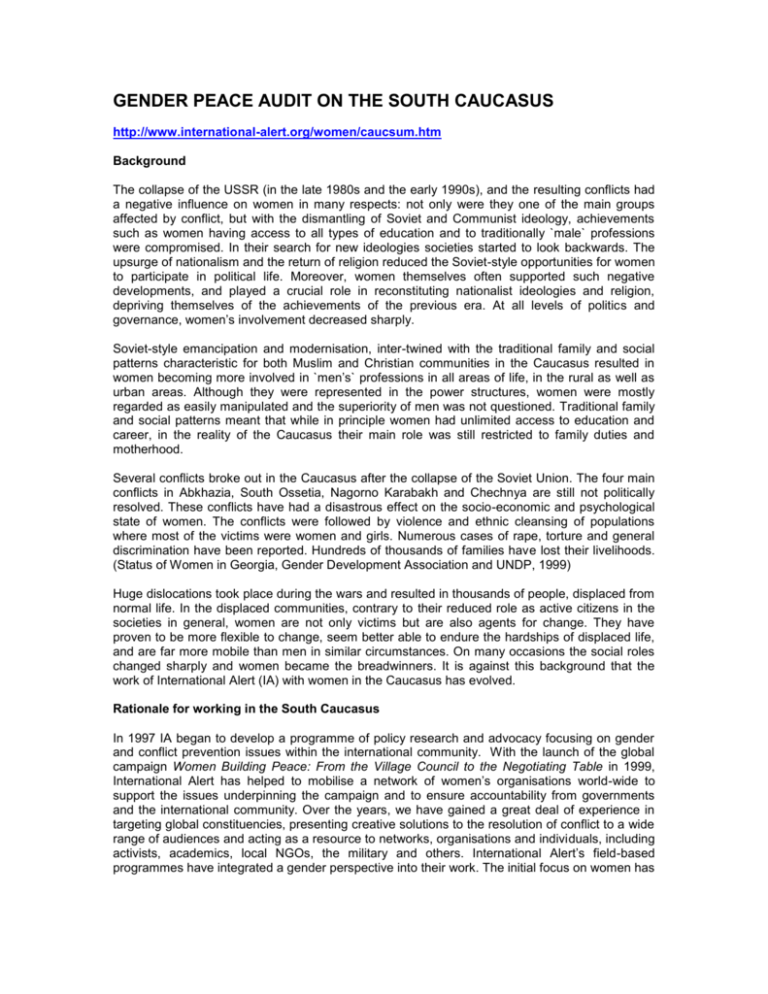
GENDER PEACE AUDIT ON THE SOUTH CAUCASUS http://www.international-alert.org/women/caucsum.htm Background The collapse of the USSR (in the late 1980s and the early 1990s), and the resulting conflicts had a negative influence on women in many respects: not only were they one of the main groups affected by conflict, but with the dismantling of Soviet and Communist ideology, achievements such as women having access to all types of education and to traditionally `male` professions were compromised. In their search for new ideologies societies started to look backwards. The upsurge of nationalism and the return of religion reduced the Soviet-style opportunities for women to participate in political life. Moreover, women themselves often supported such negative developments, and played a crucial role in reconstituting nationalist ideologies and religion, depriving themselves of the achievements of the previous era. At all levels of politics and governance, women’s involvement decreased sharply. Soviet-style emancipation and modernisation, inter-twined with the traditional family and social patterns characteristic for both Muslim and Christian communities in the Caucasus resulted in women becoming more involved in `men’s` professions in all areas of life, in the rural as well as urban areas. Although they were represented in the power structures, women were mostly regarded as easily manipulated and the superiority of men was not questioned. Traditional family and social patterns meant that while in principle women had unlimited access to education and career, in the reality of the Caucasus their main role was still restricted to family duties and motherhood. Several conflicts broke out in the Caucasus after the collapse of the Soviet Union. The four main conflicts in Abkhazia, South Ossetia, Nagorno Karabakh and Chechnya are still not politically resolved. These conflicts have had a disastrous effect on the socio-economic and psychological state of women. The conflicts were followed by violence and ethnic cleansing of populations where most of the victims were women and girls. Numerous cases of rape, torture and general discrimination have been reported. Hundreds of thousands of families have lost their livelihoods. (Status of Women in Georgia, Gender Development Association and UNDP, 1999) Huge dislocations took place during the wars and resulted in thousands of people, displaced from normal life. In the displaced communities, contrary to their reduced role as active citizens in the societies in general, women are not only victims but are also agents for change. They have proven to be more flexible to change, seem better able to endure the hardships of displaced life, and are far more mobile than men in similar circumstances. On many occasions the social roles changed sharply and women became the breadwinners. It is against this background that the work of International Alert (IA) with women in the Caucasus has evolved. Rationale for working in the South Caucasus In 1997 IA began to develop a programme of policy research and advocacy focusing on gender and conflict prevention issues within the international community. With the launch of the global campaign Women Building Peace: From the Village Council to the Negotiating Table in 1999, International Alert has helped to mobilise a network of women’s organisations world-wide to support the issues underpinning the campaign and to ensure accountability from governments and the international community. Over the years, we have gained a great deal of experience in targeting global constituencies, presenting creative solutions to the resolution of conflict to a wide range of audiences and acting as a resource to networks, organisations and individuals, including activists, academics, local NGOs, the military and others. International Alert’s field-based programmes have integrated a gender perspective into their work. The initial focus on women has been to shift the general level of inequality and make more visible the previously neglected capacities of women in conflict situations. Since then, International Alert has established a women’s branch in its Eurasia programme, with joint projects led by local partner organisations in both the North and the South Caucasus. In 1998, IA held a women’s confidence-building workshop where women mainly from Georgia, Abkhazia and other areas of the South Caucasus, but also from the North Caucasus took part. This workshop resulted in the development of several ideas for common projects including the formation of the Caucasus Forum (a network of NGOs working for peace in the Caucasus, constituted in July 1998). The next benchmark of Alert’s work with women was co-participation, with the Caucasus Forum in a conference entitled ‘South Caucasus Women Building Peace’ (Tbilisi, October 2000). This conference resulted in the creation of a network of women’s organisations known as the `Caucasus Women’s League` (CWL) the last meeting of which took place in September 2001. The CWL is made up of women leaders of non-governmental organisations from all the regions of the North and South Caucasus working on a variety of issues related to conflict transformation and peacebuilding. Following discussions with IA staff and partner organisations working in the region, it was agreed that a feasibility study should be carried out to look into the issues of women, peace and security in the South Caucasus from the perspective of developing a framework for policy and advocacy work. Five field trips were made to Armenia, Azerbaijan, Georgia and Abkhazia between August 2000 and October 2001 to consult women’s groups, other civil society organisations and government officials. The aim was to map the issues affecting women and to introduce the project. Overall Statement The expertise accumulated as a result of IA’s work with women, the information collated during the feasibility study, as well as the CWL’s documents have all identified several key problems related to gender, peace and security in the South Caucasus that need to be addressed. These include: the lack of security for both women and men the lack of inclusion in decision-making processes and their non-participation in procedures for good governance their absence from peace negotiations and post-conflict reconstruction processes These are immediate concerns where IA believes that it could have a crucial role in catalyzing action to change the patterns of victimization, deprivation, and negative developments that have undermined the role of women in the South Caucasus by: strengthening the capacities of women and particularly of the displaced and other communities affected by armed conflict so that they are better able to dialogue and advocate1[1] to national, regional and international policy makers for their inclusion in the decision-making process relating to conflict resolution, peacebuilding and participation in confidence-building processes. International Context The adoption of the UN Security Council Resolution 1325 on Women, Peace and Security in October 2000 was a historic event. It was one of the first occasions in which women’s voices and concerns on peace and security issues were heard at such a level. The paragraphs under the 1[1] For the purposes of this project the definition of `advocacy` will be constructive dialogue and critical engagement between civil society, governments and international community in order to address, in an inclusive and gender-sensitive manner, the issues of conflict transformation and human security Resolution cover four main areas, which are relevant to the problems faced by women in the South Caucasus. These are: the participation of women in decision-making and peace processes; the integration of gender perspectives and training in peacekeeping operations; the protection of women in armed conflict; and gender mainstreaming in UN reporting and implementation mechanisms. The Resolution also encourages the international community to provide sustainable and sufficient technical, financial and other resources to enable women to engage in peace and security initiatives. International Alert, together with four other US-based NGOs2[2], UN agencies, key security council governments as well as women’s organisations from all over the world, were instrumental in securing the unanimous adoption of this Resolution through the global campaign ‘Women Building Peace: From the Village Council to the Negotiating Table’. Having achieved the development of this important policy, the next step and the challenge is to translate that policy into effective practice so that it benefits civil society organisations, particularly women engaged in peacebuilding on the ground. The Gender Peace Audit3[3] project will work with local women to elicit their perspectives on the Resolution and ensure that their voices contribute to its effective implementation. The work proposed in the South Caucasus will be implemented by IA’s Policy and Advocacy Department in conjunction with IA’s Eurasia programme relying on the existing peace constituencies, partners and networks. The project will contribute to a wider study that will also take place in West Africa and South Asia. THE PROJECT Purpose: The purpose of the project is to support local peace actors particularly women, in their conflict transformation and peacebuilding work by enabling them to engage in constructive dialogue on their needs with national, regional and international policy-makers within the framework of UNSC Resolution 1325. Objectives To raise awareness among the international organisations about the key issues affecting women’s peace and security in the South Caucasus To support women in the systematic documentation of their know-how and peacebuilding activities and in the identification of lessons learnt and challenges faced To strengthen the capacity of the League to engage in dialogue with national, regional and international policy-makers and decision-takers on the following issues: - inclusion at all levels of peace processes and in the reconciliation and reconstruction processes in the South Caucasus - the protection and representation of displaced, refugee and other disadvantaged women - participation in decision-making and ensuring a gender perspective in processes that affect their peace and security Activities 2[2] Consultative meetings that will enable the League, other women’s organisations, civil society groups and relevant government officials to discuss critical issues affecting women’s peace and security and elicit women’s perspectives on Resolution 1325 and its possible use as an advocacy tool. Women’s International League for Peace and Freedom (WILPF), the Hague Appeal for Peace, Amnesty International and the Women’s Commission for Refugee Women and Children (WCRWC). 3[3] For the purposes of this project , Gender Peace Audit refers to the systematic review by women of the implementation of policies relating to peace and security issues affecting women e.g. Convention for the Elimination of All Forms of Discrimination Against Women (CEDAW). Workshops to develop and agree a framework for monitoring the implementation of relevant international and regional policies relating to women, peace and security issues and to analyse ways in which these can be influenced so that women’s needs and perspectives are integrated. Focus group discussions and follow-up workshops to discuss and agree a framework for the documentation and analysis of women’s peacebuilding know-how, including the lessons learnt and challenges faced by women in situations of armed conflict. These discussions will also provide an opportunity to develop impact indicators and policy recommendations that can be shared amongst women’s groups as well as with policy-makers and decision-takers. Development of an advocacy manual on women, peace and security issues that women’s groups and organisations can use to enhance their knowledge of the issues and to strengthen their advocacy skills on peace and security issues. Outputs A report on the regional consultative meeting in the South Caucasus. A synthesis paper encapsulating all the issues generated by the feasibility studies and consultation undertaken in the South Caucasus, South Asia and West Africa. A monitoring framework and indicators that will be used by women’s groups to review the implementation of relevant policies affecting women’s peace and security in the South Caucasus. A book on women’s peace building know-how. A documentary film on women’s peacebuilding activities. An advocacy manual which will be enriched with case studies and examples of women’s peacebuilding know-how drawn from the consultations, workshops and documentation of know how (including the South Caucasus) and that will be tested with women’s groups and organisations in the region. Methodology and Approach The project approaches the work within a human security4[4] framework, which includes the consideration of structural, physical and psychological factors that affect the security of both men and women. The principles through which International Alert works with partners are set out in IA’s Code of Conduct and include building effective working relationships, developing trust and confidence, encouraging accountability and responsibility, and learning from experience. A key principle IA hopes to bring to the process is the emphasis on working with local partners in the true spirit of collaboration, exchange and learning. The existence of local ownership is of immense importance, including facilitating the identification of local needs and the implementation of locally-driven agendas. Ensuring effective and open channels of communication, sustaining relationships and practising cultural sensitivity are equally essential. In the South Caucasus, civil society is at a relatively nascent stage. While there are many NGOs, only a few are actively engaged in advocacy and policy on women’s issues. International Alert, 4[4] Human security places a focus on the security of people. This constitutes a major and necessary shift in international relations and world affairs, which have long placed predominant emphasis on the security of the state. By broadening the focus to include the security of people, human security encompasses a spectrum of approaches to the problem of violent conflict, from preventive initiatives and people-centred conflict resolution and peacebuilding activities to – in extreme cases, where other efforts have failed – intervention to protect populations at great risk. Human security means freedom from pervasive threats to people's rights, safety or lives (Canadian Department of Foreign Affairs and International Trade) through its Eurasia programme, already has established partners in the region and has been supporting the building of their capacities. The project is a logical continuation of these efforts and will work in partnership with local partner organisations and networks such as the Caucasus Women’s League and the Caucasus NGO Forum. Engaging the governments in the region in a constructive dialogue with local women’s groups is an essential part of the project. This way our work will have a positive impact on the peace and security processes in the South Caucasus. Co-ordination with other international organisations, including donors, and local organisations is important for the successful implementation (and impact) of the project. Such actors have been identified in the feasibility study and contact will be maintained during the course of this project. International Alert’s approach to advocacy relies upon policy research, bilateral dialogue and multi-level consultations. Issues and examples addressed in the planned consultations will be documented in subsequent policy reports and briefings incorporating the perspectives of women on peace and security issues and on UNSC Resolution 1325.
